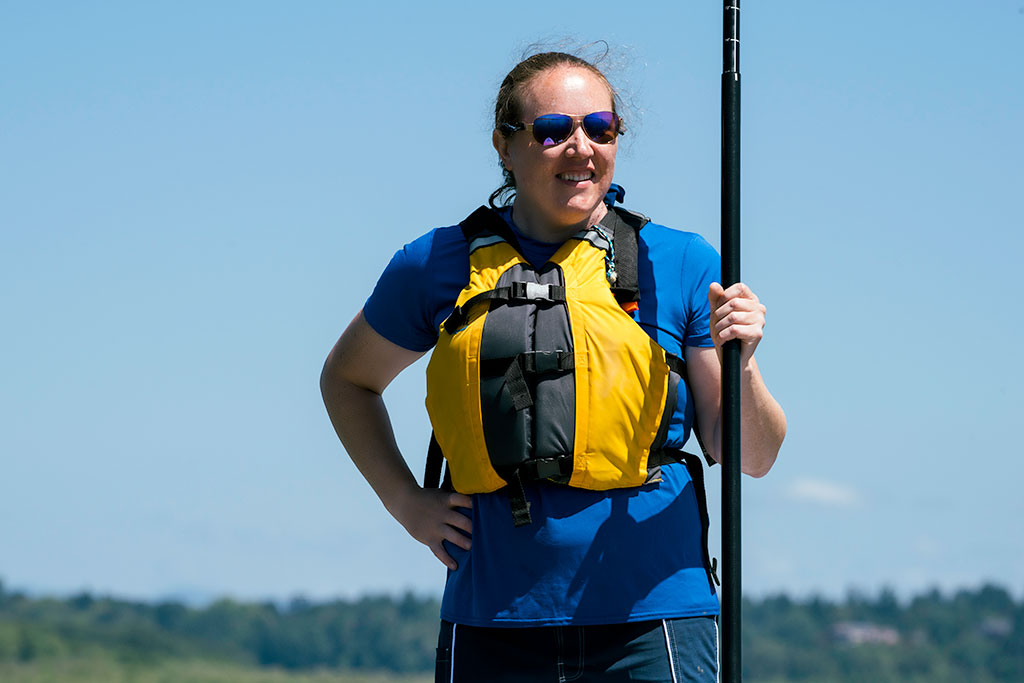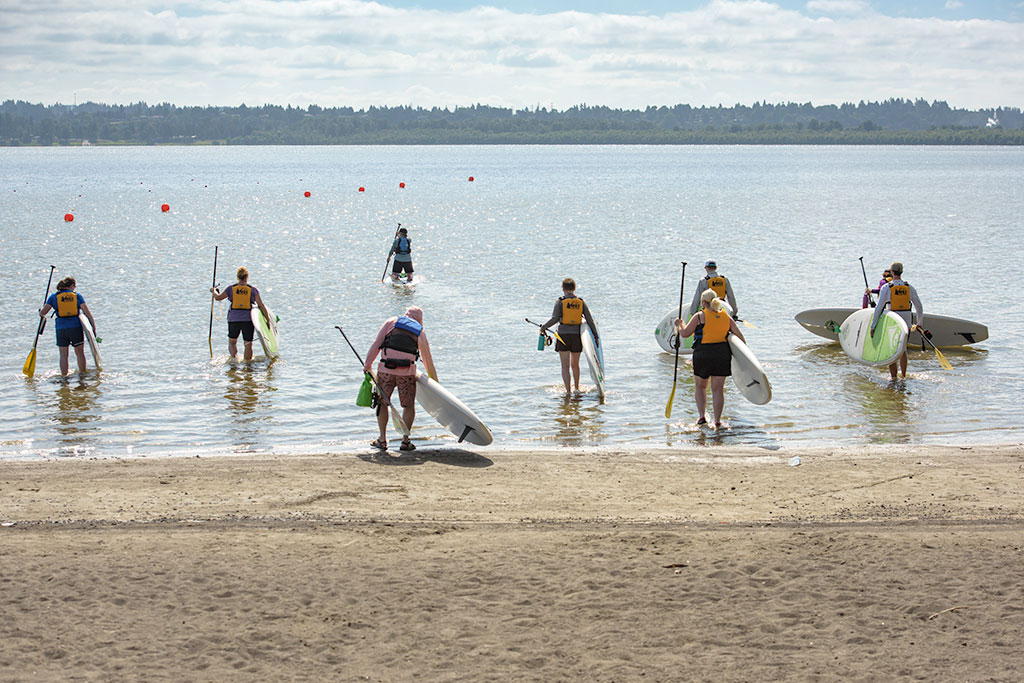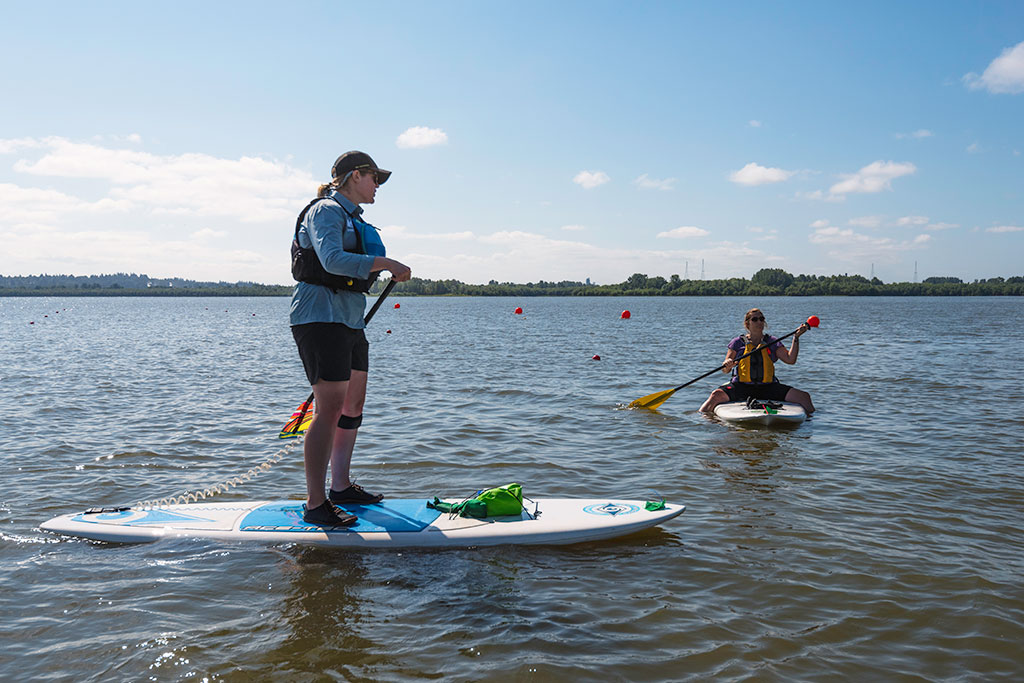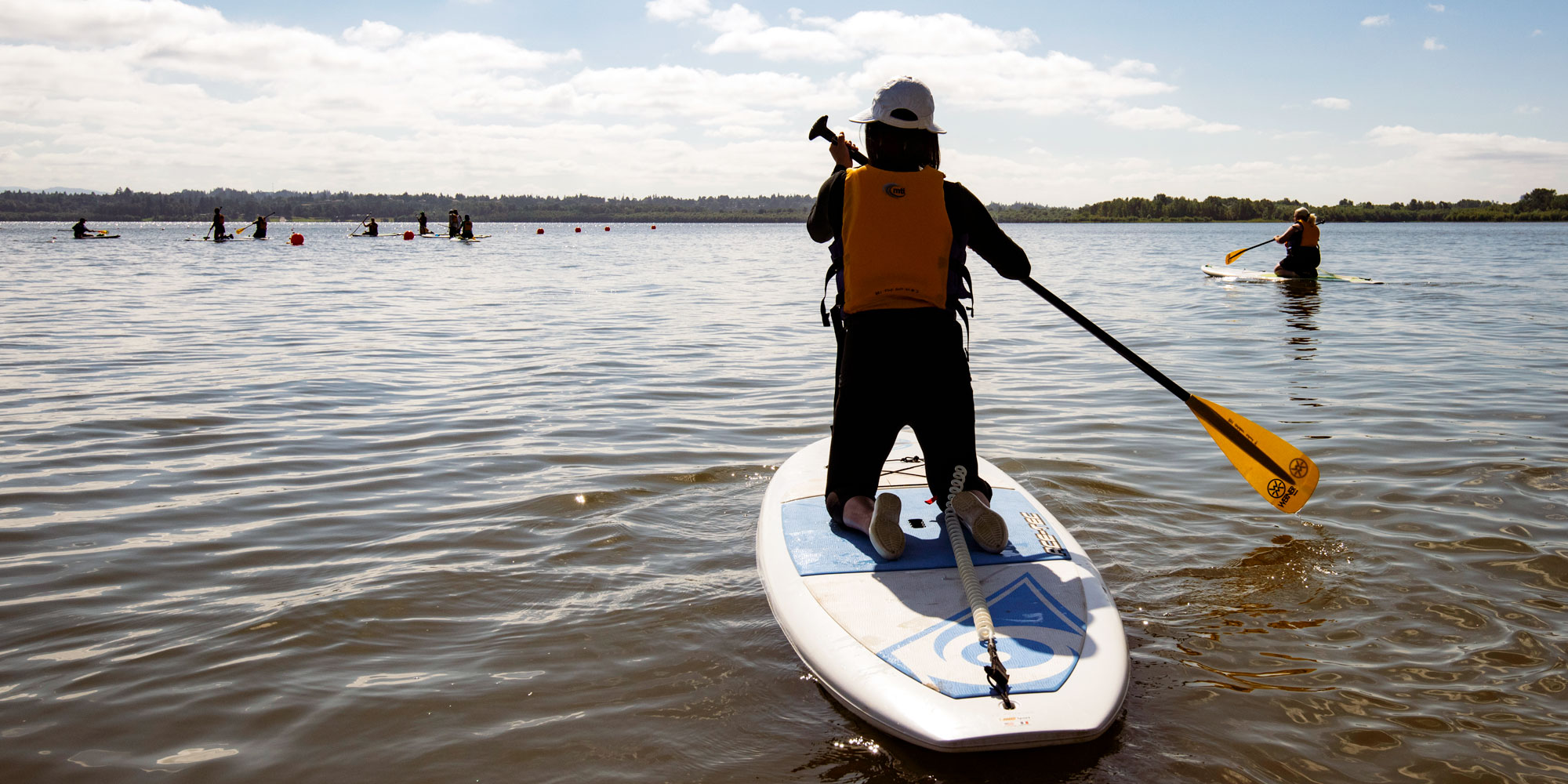It doesn’t matter how shallow the water is, most people don’t want to fall in. And because it’s pretty much everyone’s first time on a stand up paddle board, they’re looking at these floating 11-foot-long pieces of fiberglass with some suspicion. But as the group of 12 participants heads out onto the calm waters of Vancouver Lake, Washington, they’re all smiles.
Angie Lampe, today’s First Descents alumni lead, is near the front. Having grown up in Iowa, Lampe is a long way from “home,” but here, surrounded by strangers, she’s come to appreciate different definitions of the word. She seems at ease; grabbing her board and her paddle, she wades into the glassy lake like she’s done it a thousand times before—even though it’s her first time too.

Angie Lampe serves as the First Descents alumni lead during a trip on Vancouver Lake. (Photo Credit: Jason Hummel)
First Descents is a Denver-based nonprofit dedicated to providing life-changing outdoor adventures for young adults impacted by cancer. Recognizing the power of firsts, the organization aims to create those experiences in communities across the country. When you think about it, the outdoors is full of firsts, from someone’s first overnight in the backcountry to their first time on the water. Even people with a wealth of outdoor experience may face things they’ve never encountered—moments that surprise them, test their resolve or teach them something new about themselves—whenever they’re outside. Because no matter where you are or what you’re doing, firsts help us understand our limits and push past them.
***
The organization’s focus on young adults, participants ages 18 to 39, might surprise some people. However, cancer is the fourth leading cause of death for people 20 to 39, behind accidents, suicide and homicide, according to the American Cancer Society (ACS). Each year in the U.S., roughly 70,000 young adults (ages 15 to 39) are diagnosed with cancer.
Which unfortunately means cancer hits close to home for a lot of people. This year alone, an estimated 1.76 million new cases (for all ages) will be diagnosed in the United States, according to the ACS. So, it’s not surprising that some folks at First Descents have personal reasons to be a part of the organization—beginning with the founder, Brad Ludden. When he was 12, his then-38-year-old aunt was diagnosed with breast cancer. Ludden was an internationally recognized kayaker at that time, and he started volunteering for a local pediatric oncology program by teaching the participants like his aunt how to kayak. By the age of 18, Brad started working on an organization that would eventually be known as First Descents, founded in 2001.

First Descents participants head out onto Vancouver Lake. (Photo Credit: Jason Hummel)
“First Descents has been a strong believer in the power of the outdoors—in terms of the people you’re with, the places you’re going to and the activity you’re doing together. The outdoors allows for individual growth, as well as community,” said Mackenzie McGrath, director of programs at First Descents. McGrath, a seasoned rock and ice climber who recently completed a certificate program at Harvard University titled Global Mental Health: Trauma and Recovery, was first inspired to join First Descents in 2013, when her brother was diagnosed with stage IV esophageal cancer. “He and I were both avid outdoors persons. And I think [First Descents] was attractive to him because it was the only community where he could go out and not be defined by his illness. He wouldn’t be judged by people. He’d be widely accepted by those around him.”
Because everyone’s relationship with cancer is different, the team at First Descents curates its programming around everything from whitewater kayaking in Jackson Hole, Wyoming, to an introduction to outdoor rock climbing class at an Oregon state park. Participants can get outside for the afternoon, nine straight days or something in between. Also, the organization offers opportunities for young adults currently in treatment or in remission, as well as some that are open to their caregivers and their plus-ones.
First Descents Programs
First Descents offers three types of programs:
- Weeklong: The nonprofit’s staple weeklong program offers first-time participants the opportunity to engage in an intense outdoor activity, such as whitewater kayaking on spectacular rivers like the Clark Fork River in Montana.
- Local Programs: These local, multi-day and single-day adventures take place in cities across the country and offer some more accessible activities like hiking, gym climbing or paddle boarding.
- FDX: First Descent’s international offerings are available to alumni of weeklong programs; during these trips, a smaller group can have an immersive experience in a place like Ecuador.
Most programs are free, but for FDX trips, the organization sets a fundraising requirement for participants. However, First Descents sets fundraising goals for each trip that exceed the total cost of the program. So, it’s a type of pay-it-forward model, where certain FDX trips can help young adults attend weeklong and local trips across the country, free of charge.
Although getting outside and trying something new is a benefit, it doesn’t stop there. First Descents says it helps with ongoing psychosocial supportive care, which can impact long-term survivorship health. And according to Lampe, the crux of that comes down to the community. “First Descents provides you with that young adult community that so many people need since cancer is already so isolating. The more people learn about FD, the greater impact it’s going to have in helping people heal,” she said.
That community was something Lampe initially lacked after she was diagnosed with cancer in 1999 at the age of 17. “I was placed on the adult ward. I was surrounded by 40-, 50-, 60-year-olds. Everyone I knew that had cancer had died,” she says. “I [did] some searching on the internet for young cancer survivors and I found [First Descents], but I never joined. All their programs were on the West Coast, so I thought it was too far away,” she said.
“They don’t see the disease. There’s something else that identifies you. It’s your willingness to get out there and push your boundaries.”
Even though she was cancer free by the early 2000s, some people in her Iowa town still treated her like she was sick. Plus, she lived near the hospital where she underwent treatment. As a result, it was hard for her to move on and heal emotionally, even though physically she was getting better. So she eventually moved to Portland, Oregon, of all places, despite knowing nearly nothing about it. There, surrounded by ample opportunities to get outside, she started hiking. My dog and I “would go hiking every day when I first moved here, and really that’s what helped heal me emotionally. I was healed physically, but emotionally I was still pretty raw,” she said.
Another step in her healing journey came in 2012, when she was undergoing surgery to remove a benign tumor. An intern at the hospital—which had a partnership with First Descents—stopped by her room and invited her to get involved with the organization. Not long after, she joined a weeklong whitewater kayaking adventure in Jackson Hole.
First Descents “removes that cancer identity,” she said, adding, “because everyone has cancer, so it’s not going to single you out. They don’t see the disease. There’s something else that identifies you. It’s your willingness to get out there and push your boundaries.”
Following those short daily hikes with her dog and her first First Descents trip, Lampe has gone on to climb major peaks in the Northwest. She’s now summited Mount St. Helens, one of Washington’s five volcanoes, multiple times. And last year, she summited Oregon’s Mount Hood through “Climb for Clean Air,” which benefits the American Lung Association. “Now that I climbed it, I can look at [Mount Hood] from Portland every day and just kind of think, ‘I really had that strength in me.’ That mountain represented everything I’d ever been through. I said, ‘If I can climb that, then I can do anything.’”
The emotional benefits of being outside are hard to ignore. A study published in the Journal of Psychosocial Oncology found that participants in a First Descents program noted a rise in self-compassion and self-esteem, along with a decrease in depression and alienation.
As Lampe puts it, she was finally able to chart her own course. “When you’re going through treatment you feel like you don’t have any control over your life. So for me it was like, ‘I’m going to go do this trail,’ and I can plan and map things out. I felt like it gave me some control back into my life,” she said.
A separate study published in Supportive Care in Cancer, the official journal of the Multinational Association of Supportive Care in Cancer, found First Descents participants experienced “significant reductions in distress and improvements in self-efficacy and social support.” This balance between getting to know yourself, and other people in your community is partially responsible for the organization’s success, according to McGrath.
***
As participants paddle around Vancouver Lake, the sun beats down from above, a slight wind rolls across the water and it’s so clear, you can see Mount Rainier on the horizon. It’d be easy to look around and think the only thing people are taking away is some new paddling techniques. But like every First Descents program, there’s more happening out here. “You’re not thinking about how you were sick or what stuff you have to do back at home. All you think about is enjoying that moment. And it reminds you you’re alive,” Lampe said.
Helping Lampe lead the event at Lake Vancouver is Sara Schab, a coordinator for REI Outdoor Programs and Experiences. REI’s partnership with First Descents began in 2018, when instructors and guides, paired with the organization’s alumni leads, facilitated Local Adventure Programs in San Diego, Washington, D.C., and Portland. Schab spent the last five years guiding programs on and off the water for REI. Although this is her first outing with First Descents, she believes it won’t be her last. “I hope REI can continue to bring folks together, and give them an opportunity to safely recreate outdoors, spend time with others who have likely had similar experiences, and maybe learn a thing or two along the way,” Schab said.

Sara Schab leads First Descents participants on Vancouver Lake. (Photo Credit: Jason Hummel)
Even if you aren’t or haven’t been impacted by cancer, we all search for connections—to people, to places, and at times even just things—that make us feel like we’re alive and less alone. However, for young adults impacted by cancer, sometimes those things can be difficult. Sometimes life doesn’t always look like calm water. But according to McGrath, “there’s nothing like First Descents that can make people feel not so alone. It just brings people joy, whether they have a few weeks, a few years or the rest of their life to live.”
For those of us who love the outdoors, thinking back to our first experiences outside is usually fun. Even if they didn’t go as planned. Even if we were scared, or if we screwed up, we were present. There was some sense of joy, some wonder. Maybe even a little magic that made us come back again and again. Whether it’s a walk in the woods or a trip down a river, we all find something worth saving along the way. And no matter what you’re going through, that’s important.
If you’re interested in getting involved with First Descents, as a participant or volunteer, visit their website here.
***
This story is dedicated to Annie Fuller, a friend and First Descents alumni who lost her life to cancer in 2018. Annie was a kind, compassionate and steadying presence in so many people’s life. She is loved and missed by all that knew her.


